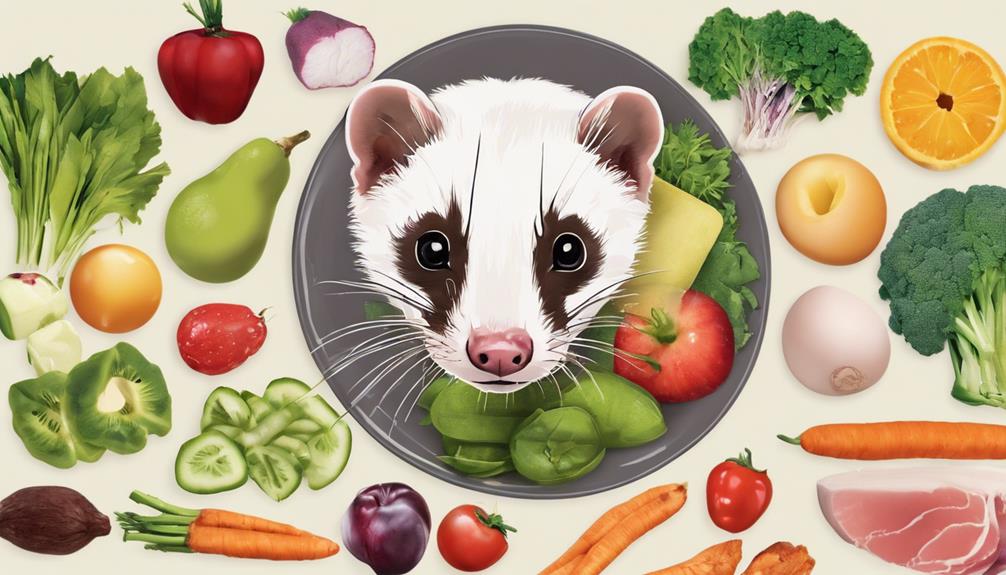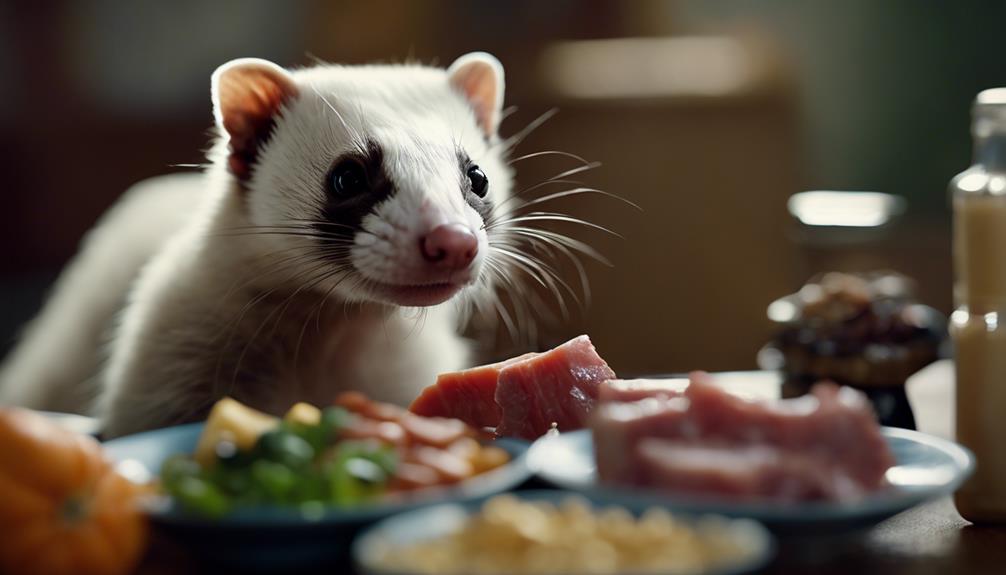How to Ensure Balanced Nutrition for Ferrets With Insulinoma

Balanced nutrition is essential for ferrets with insulinoma, a condition where the pancreas produces too much insulin. To support their health, it is crucial to provide a diet that helps maintain stable blood sugar levels. This includes feeding a high-quality, protein-rich diet that is low in carbohydrates. Additionally, offering small, frequent meals throughout the day can help prevent blood sugar spikes and crashes. Fresh water should always be available, and treats should be limited to avoid excess sugar intake. Consulting with a veterinarian or a ferret nutritionist can help create a customized diet plan to meet the specific needs of a ferret with insulinoma.
Implementing these dietary guidelines can significantly improve the quality of life for ferrets with insulinoma. By prioritizing balanced nutrition and monitoring their food intake carefully, ferret owners can help manage their pet's condition effectively and support their overall well-being.
Understanding Insulinoma in Ferrets
Insulinoma in ferrets, a common pancreatic tumor, results in overproduction of insulin, leading to low blood sugar levels. Symptoms of insulinoma in ferrets include weakness, lethargy, confusion, and seizures due to the decreased glucose levels in their bloodstream. To manage this condition effectively, treatment options often involve surgery to remove the tumor, medication to regulate insulin levels, and dietary modifications.
Dietary restrictions are crucial for ferrets with insulinoma. Meal planning strategies should focus on providing frequent small meals rich in protein and healthy fats while avoiding sugary and high-carbohydrate foods. Monitoring glucose levels regularly is essential to adjust the diet and medication as needed. Maintaining stable insulin levels is key to preventing hypoglycemia episodes in ferrets with insulinoma.
Importance of Balanced Nutrition

A nutrient-rich diet plays a crucial role in supporting the overall health of ferrets with insulinoma. Understanding the specific dietary considerations for ferrets with this condition is essential for managing their symptoms effectively.
Optimal food choices can help regulate blood sugar levels and provide the necessary nutrients for a balanced and healthy diet.
Nutrient-Rich Diet Benefits
Nutrition plays a critical role in supporting the overall health and well-being of ferrets diagnosed with insulinoma. A nutrient-rich diet benefits these furry friends by aiding in essential nutrient absorption and promoting optimal digestive health. Ensuring that ferrets with insulinoma receive a well-balanced diet is crucial for managing their condition and improving their quality of life. Providing a diet rich in high-quality protein, healthy fats, and complex carbohydrates can help stabilize blood sugar levels and provide sustained energy. Additionally, incorporating vitamins and minerals such as vitamin E, selenium, and omega-3 fatty acids can further support their overall health. Below is a table highlighting key nutrients beneficial for ferrets with insulinoma:
| Nutrient | Function | Food Sources |
|---|---|---|
| Protein | Tissue repair and growth | Meat, eggs, fish |
| Healthy Fats | Energy source and skin health | Fish oil, flaxseed |
| Complex Carbohydrates | Sustained energy | Vegetables, fruits |
Insulinoma Dietary Considerations
Considering the unique dietary needs of ferrets with insulinoma, a balanced nutrition plan is essential to support their health and well-being. Meal planning plays a crucial role in managing insulin regulation for these furry companions. To maintain stable blood sugar levels, frequent, small meals are recommended throughout the day.
These meals should consist of high-quality protein sources to aid in muscle maintenance and repair. Carbohydrates should be limited to prevent spikes in blood sugar levels. Healthy fats can provide a concentrated source of energy while aiding in nutrient absorption.
Optimal Food Choices
To ensure optimal health and well-being for ferrets with insulinoma, selecting appropriate food choices is crucial for maintaining balanced nutrition. When considering the diet for ferrets with insulinoma, here are some key factors to keep in mind:
- Protein Sources: Opt for high-quality protein sources such as whole animal proteins like chicken, turkey, or lamb. These proteins are essential for muscle maintenance and overall health.
- Portion Control: Ensure proper portion sizes to prevent overfeeding, which can lead to weight gain and exacerbate insulinoma symptoms.
- Fiber Content and Treat Options: Incorporate fiber-rich vegetables like bell peppers and carrots into their diet to aid digestion. Choose low-sugar treats like freeze-dried meats to satisfy their cravings without spiking blood sugar levels.
Selecting Suitable Foods

When choosing foods for a ferret with insulinoma, focus on high-protein, low-carbohydrate options to support their health. Ferrets require a diet rich in animal-based proteins to meet their nutritional needs. Foods like high-quality meat-based cat foods, cooked eggs, or specially formulated ferret foods are excellent choices. These foods provide essential amino acids necessary for the ferret's well-being. Including food variety in their diet is important to ensure they receive a wide range of nutrients. When meal planning, consider rotating between different protein sources to offer a balanced nutritional profile.
Additionally, when selecting treat options for ferrets with insulinoma, opt for protein-rich snacks like freeze-dried meat treats or cooked meats. Avoid sugary treats or those high in carbohydrates, as they can negatively impact their blood sugar levels. Treats should be given in moderation and be factored into their overall daily food intake. By carefully selecting suitable foods and treats, you can help maintain your ferret's health and well-being while managing their insulinoma condition effectively.
Monitoring Sugar Intake

Monitoring sugar intake in ferrets with insulinoma involves closely evaluating the carbohydrate content of their food and treats to maintain stable blood sugar levels. In this condition, managing sugar levels is crucial to prevent spikes in insulin that can worsen symptoms. Here are three key points to consider for effective sugar monitoring:
- Sugar Monitoring: Regularly check the carbohydrate content of commercial ferret foods and treats. Opt for products with low sugar content to prevent rapid glucose fluctuations.
- Insulin Levels: Keep track of your ferret's insulin levels through regular vet visits. Monitoring insulin levels is essential to adjust dietary strategies and ensure proper management of the condition.
- Dietary Adjustments: Work closely with your veterinarian to make necessary dietary adjustments based on your ferret's glucose regulation needs. Tailoring the diet to your pet's specific requirements can help stabilize blood sugar levels and improve overall health.
Feeding Frequency and Portions

Maintaining a consistent feeding schedule with appropriate portion sizes is essential for managing insulin levels in ferrets with insulinoma. Portion control plays a crucial role in regulating blood sugar levels and preventing spikes that could exacerbate the condition. For ferrets with insulinoma, it's recommended to feed small, frequent meals throughout the day to help stabilize their blood glucose levels. Dividing their daily food intake into several portions can help avoid sudden drops or spikes in blood sugar.
When establishing a feeding schedule for a ferret with insulinoma, it's important to consult with a veterinarian to determine the appropriate number of meals per day and portion sizes based on the individual ferret's needs. Typically, feeding small meals every 4-6 hours can help maintain a steady supply of nutrients without overwhelming the pancreas with excessive glucose levels at once. By practicing portion control and adhering to a consistent feeding schedule, ferret owners can better manage insulinoma and support their furry companions' health and well-being.
Supplementing Essential Nutrients

Ferrets with insulinoma require carefully balanced nutrition, including essential nutrients that may need to be supplemented. Key nutrient sources, such as high-quality protein and healthy fats, are crucial components of their diet.
Proper dosage recommendations for essential nutrients must be based on the individual ferret's health status and specific dietary needs.
Key Nutrient Sources
To support optimal health in ferrets with insulinoma, ensuring a well-rounded diet rich in key nutrient sources is crucial for providing essential nutrients. When supplementing essential nutrients, consider the following:
- High-Quality Protein: Opt for protein sources like cooked meat and eggs to support muscle maintenance and overall health.
- Healthy Fats: Include omega-3 fatty acids from sources such as fish oil to aid in nutrient absorption and promote a healthy coat.
- Vitamins and Minerals: Ensure a balanced intake of essential vitamins like A, D, and E, along with minerals such as calcium and phosphorus to support digestive health and overall well-being.
Proper Dosage Recommendations
When considering proper dosage recommendations for supplementing essential nutrients in ferrets with insulinoma, it's crucial to tailor the amounts based on individual needs to ensure optimal health outcomes.
Dosage management plays a vital role in maintaining the delicate balance of nutrients necessary for a ferret's well-being. Nutritional supplements should be administered in accordance with veterinary advice, taking into consideration the severity of the insulinoma and the specific nutritional requirements of the ferret.
It's essential to monitor the ferret's response to the supplements and adjust dosages accordingly. Precision in dosage management is key to preventing deficiencies or toxicities that could exacerbate the condition.
Consulting with a veterinarian specializing in exotic pets is recommended to develop a personalized supplementation plan for ferrets with insulinoma.
Consulting With a Veterinarian

Seeking guidance from a veterinarian is crucial for addressing the specific dietary needs of a ferret with insulinoma. When consulting with a vet, there are several key points to consider:
- Vet Recommendations: Veterinarians experienced in treating ferrets with insulinoma can provide tailored advice on dietary adjustments to help manage the condition effectively.
- Individualized Care: A vet can assess the ferret's overall health, insulinoma severity, and response to treatment to recommend personalized dietary changes.
- Monitoring Progress: Regular check-ups with the vet allow for adjustments to be made based on the ferret's response to the diet, ensuring optimal nutrition and insulinoma management.
Frequently Asked Questions
Can Ferrets With Insulinoma Still Enjoy Treats or Snacks?
Ferrets with insulinoma may still enjoy treats in moderation, but it's essential to choose wisely. Limit sugary or high-carb snacks to prevent blood sugar spikes. Opt for low-carb options like cooked meat or eggs for healthier indulgences.
Are There Any Specific Brands or Types of Commercial Ferret Food That Are Recommended for Managing Insulinoma?
For ferrets managing insulinoma, it's crucial to select appropriate commercial ferret foods that are low in simple sugars and high in protein. Some recommended brands include Wysong, Marshall, and Orijen. Nutritional supplements like omega-3 fatty acids can also support insulinoma management.
How Can I Ensure My Ferret Is Getting Enough Exercise to Help With Their Insulinoma?
Though it may seem ironic, ensuring a ferret with insulinoma gets enough exercise is crucial for their health. Indoor activities like playtime and providing exercise equipment and toys can help keep them active and improve their condition.
Are There Any Natural Remedies or Supplements That Can Help Support a Ferret With Insulinoma?
Natural remedies and supplements can support the management of ferrets with insulinoma. Providing balanced nutrition is crucial. Consult a vet for tailored advice. Consistent care, appropriate diet adjustments, and monitoring are essential for optimal support.
Can Ferrets With Insulinoma Still Eat Fruits or Vegetables as Part of Their Diet?
Ferrets with insulinoma should avoid fruits due to their high sugar content. Vegetables are beneficial, providing essential nutrients. Nutritional alternatives like high-protein, low-carb diets can help. Consulting a vet for dietary adjustments is crucial for balanced nutrition.











